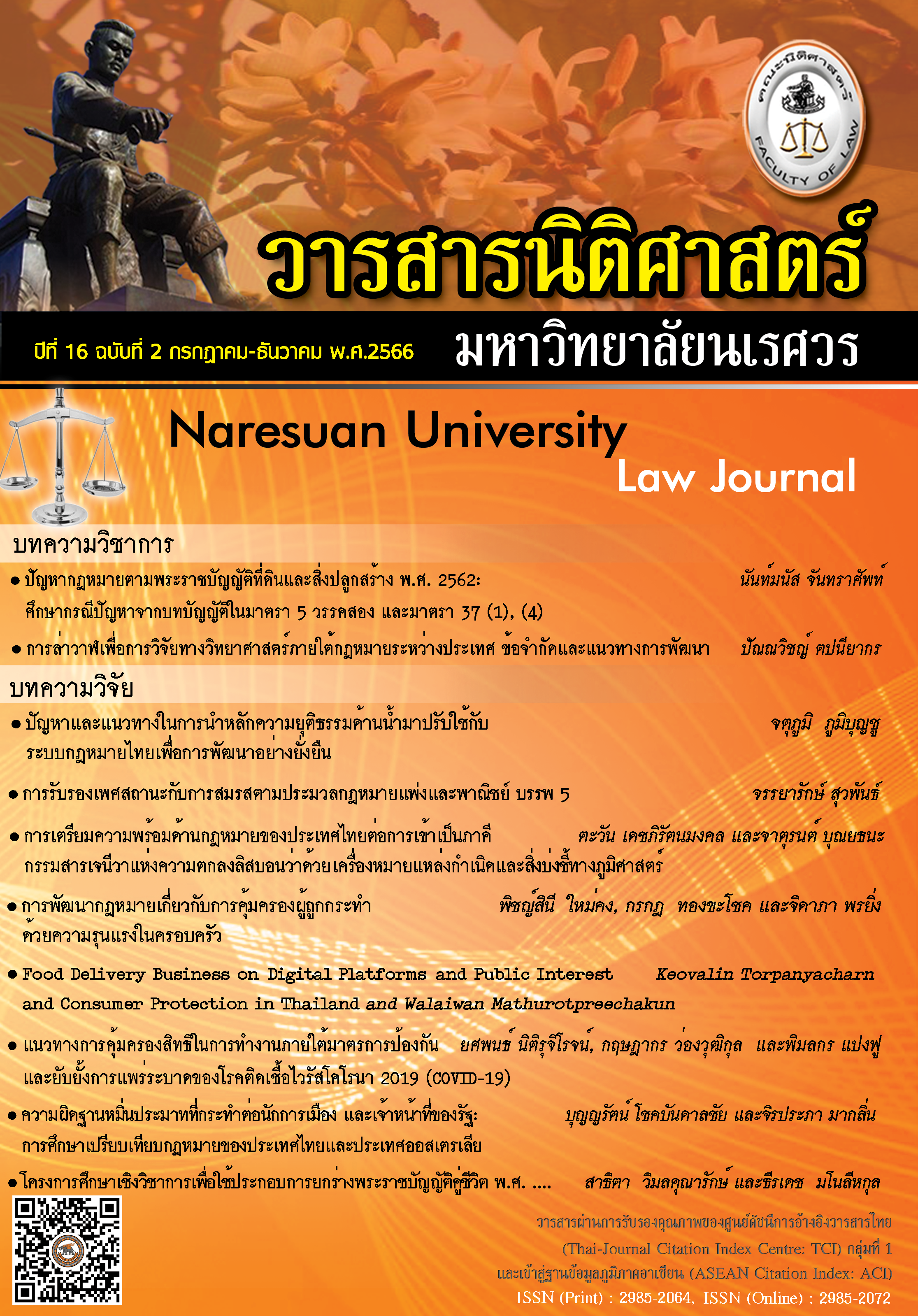การเตรียมความพร้อมด้านกฎหมายของประเทศไทยต่อการเข้าเป็นภาคีกรรมสารเจนีวาแห่งความตกลงลิสบอนว่าด้วยเครื่องหมายแหล่งกำเนิดและสิ่งบ่งชี้ทางภูมิศาสตร์
Main Article Content
บทคัดย่อ
การวิจัยเรื่องนี้มีวัตถุประสงค์ (1) ศึกษาพัฒนาการ แนวคิด และทฤษฎีที่เกี่ยวข้องกับการเข้าเป็นภาคีกรรมสารเจนีวา (2) ศึกษาระบบจดทะเบียนระหว่างประเทศในเครื่องหมายแหล่งกำเนิดและสิ่งบ่งชี้ทางภูมิศาสตร์ตามความตกลงลิสบอน กรรมสารเจนีวา ระเบียบประชาคมยุโรป และการคุ้มครองสิ่งบ่งชี้ทางภูมิศาสตร์ภายใต้ความตกลงว่าด้วยสิทธิในทรัพย์สินทางปัญญาที่เกี่ยวกับการค้า กับระบบขึ้นทะเบียนสิ่งบ่งชี้ทางภูมิศาสตร์ตามกฎหมายไทย (3) วิเคราะห์ระบบจดทะเบียนระหว่างประเทศในเครื่องหมายแหล่งกำเนิดและสิ่งบ่งชี้ทางภูมิศาสตร์ตามความตกลงลิสบอน กรรมสารเจนีวา ระเบียบประชาคมยุโรป เปรียบเทียบกับการคุ้มครองสิ่งบ่งชี้ทางภูมิศาสตร์ภายใต้ความตกลงว่าด้วยสิทธิในทรัพย์สินทางปัญญาที่เกี่ยวกับการค้า และระบบขึ้นทะเบียนสิ่งบ่งชี้ทางภูมิศาสตร์ตามกฎหมายไทย (4) เสนอแนวทางการเตรียมความพร้อมด้านกฎหมายต่อการเข้าเป็นภาคีกรรมสารเจนีวาที่เหมาะสมกับบริบทของประเทศไทย การวิจัยนี้เป็นการวิจัยเชิงคุณภาพ โดยการวิจัยเอกสาร และการสัมภาษณ์เชิงลึก
ผลการวิจัยพบว่า ความตกลงทริปส์ที่ประเทศไทยเป็นภาคีไม่มีบทบัญญัติเกี่ยวกับการจดทะเบียนระหว่างประเทศแต่ก็มิได้ปิดโอกาสในการใช้ระบบนี้ ขณะที่สหภาพยุโรปได้ตราระเบียบขึ้นใช้เป็นการเฉพาะสอดคล้องกับกรรมสารเจนีวาและความตกลงลิสบอน โดยให้ความคุ้มครองเครื่องหมายแหล่งกำเนิดและสิ่งบ่งชี้ทางภูมิศาสตร์อันเป็นการยกระดับความคุ้มครองสินค้าให้มีมาตรฐานในระดับที่สูงขึ้น อย่างไรก็ดี สำหรับประเทศไทยภายใต้กฎหมายฉบับปัจจุบัน ซึ่งแบ่งระดับความคุ้มครองออกเป็น 2 ระดับตามความตกลงทริปส์นั้น การเข้าเป็นภาคีกรรมสารเจนีวาจึงควรเพิ่มเติมนิยามเครื่องหมายแหล่งกำเนิด เพิ่มเติมบทบัญญัติเพื่อให้อธิบดีมีอำนาจออกอนุบัญญัติเพื่อกำหนดหลักเกณฑ์การจดทะเบียนระหว่างประเทศ แก้ไขระบบความคุ้มครองให้เป็นมาตรฐานเดียวกับกรรมสารเจนีวา โดยสิ่งที่ได้รับความคุ้มครองแล้วจะไม่ตกเป็นชื่อสามัญ และเพิ่มเติมบทบัญญัติเกี่ยวกับ
การจัดเก็บค่าธรรมเนียม การปฏิเสธความคุ้มครอง การเพิกถอน และการยกเลิกความคุ้มครองให้สอดคล้องกับกรรมสารเจนีวา
Article Details
เอกสารอ้างอิง
Bodenheimer, Edgar. Jurisprudence: The Philosophy and Method of the Law. 4th ed. Cambridge, MA: Harvard University Press, 1981.
Brownlie, Ian. Principles of Public International Law. 7th ed. New York, NY: Oxford University Press, 2008
Fontaine, Marcel. “Law harmonization and local specificities – a case study: OHADA and the law of contracts.” Uniform Law Review 18, no.1 (2013): 50-64.
Gepgraphical Indication Devision, Direction of Thai Geographical Indications 2560: Survey report on GI products entrepreneurs across the country. Bangkok: Department of Intellectural Property, Ministry of Commerce, 2560. [In Thai]
World Intellectual Property Organization. “WIPO-Administered Treaties.” Accessed June 2, 2021. https://www.wipo.int/treaties/en/ActResults.jsp?act_id=50.
World Trade Organization. “Analytical Index: TRIPS Agreement - Article 22 (Jurisprudence).” Accessed June 2, 2021. https://www.wto.org/english/res_e/publications_e/ai17_e/trips_art22_jur.pdf.


